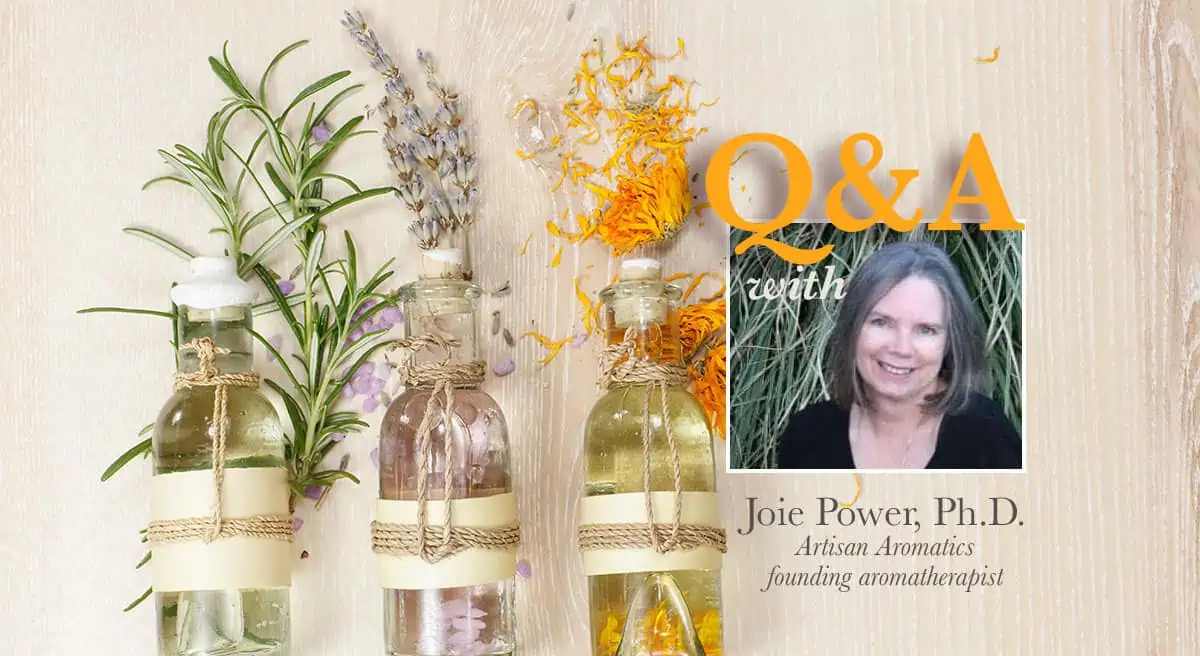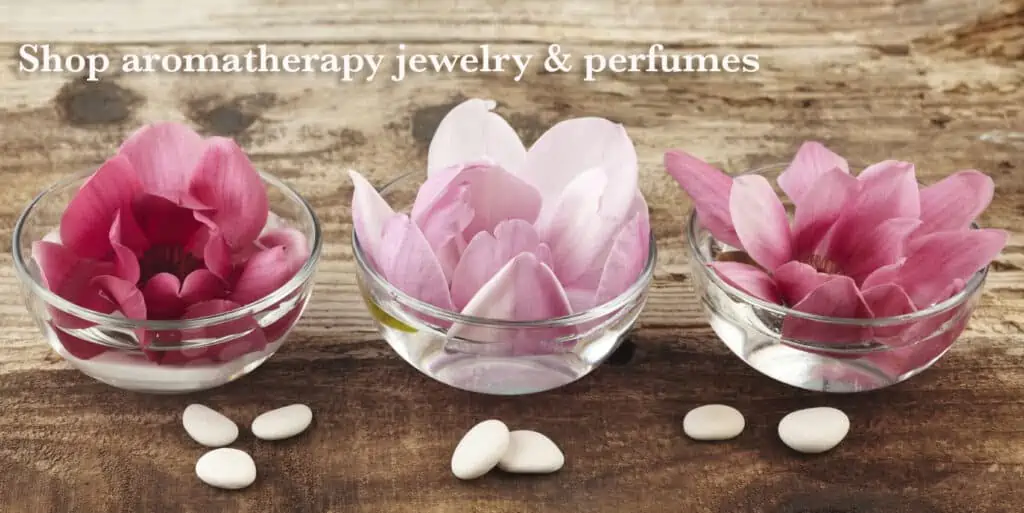
The new owner of Artisan Aromatics, Stephanie Ariel, takes a moment to reflect with founding aromatherapist, Joie Power, Ph.D., on the origins of her work with essential oils, the power of this practice, and what she wishes more people knew about aromatherapy.
How did you first get into essential oils? I was raised with grandparents who were herbalists, so I studied and used herbal medicine since childhood. I hadn’t heard of essential oils in modern use until the early 1980’s when a patient of mine who had epilepsy brought me an article about physicians in France who were using lavender essential oil to help their patients relax and have fewer seizures. I was at the Medical College of Georgia at the time and my research and clinical interests as a neuropsychologist were focused on the brain’s olfactory and limbic systems and the ways in which smells, memory and emotions are hard-wired in the brain to have powerful interactions. Because of my background in neuroscience, I saw immediately how smells could have the effects reported in the article and I was inspired to learn more about how natural plant aromas might be used therapeutically. After extensive independent study, I began to use essential oils with a few patients, and the early successes I had with those treatments convinced me that aromatherapy was an important alternative modality.
Essential oils have many benefits, from energetics (mood/balance) to energetic systems like chakras and the 5 Elements – to health benefits like anti-bacterial/viral/analgesic qualities. What area(s) do you most often use them for? In the early years of using essential oils clinically, my focus was on evidence-based uses and the western medical model because this was what was most acceptable in the settings in which I worked. With my own patients, I was using essential oils for things like inducing relaxation, promoting sleep, decreasing seizure frequency, improving attention, reducing pain and so on, all based on the results of available research. Once I got started and word spread among my colleagues, I began getting requests to work with and train nurses and other medical professionals, and to write about the neurological basis of aromatherapy. At that point, I was also starting to use essential oils for anti-pathogenic benefits and other medical applications because this was a strong interest for the nurses I worked with. When I finally retired from professional practice, I went to an herbal school where I began learning about classical Chinese Medicine and the Five Element model that it’s based on. At that point, I got very interested in working with the energetic properties of essential oils and today my biggest interest is how to use the energetic properties of essential oils in a psychotherapeutic context to facilitate personal growth.
How have they impacted your life, personally? Essential oils changed the entire course of my career and really my whole life, since I became very involved in teaching and writing about aromatherapy. My husband Ivan also went into the essential oil business so that my students and I could have access to authentic, therapeutic quality essential oils, which are crucial to the success of any aromatic intervention (and can be hard to find). The other way that they’ve had an impact, of course, is that I use them myself, especially for day-to-day problems like colds, body aches, and relaxation.
What is your process for creating a new aromatherapy blend? I have a very specific process for creating a therapeutic blend, which is the same process I use for creating an herbal blend. I devote a day to this process when I’m teaching but basically it starts with an interview to determine and define the problem you want to address. In a typical nursing situation, for example, that might be insomnia. I then list the essential oils that might potentially be useful, and if I don’t know of several good alternatives, I do a little research to find out. At that point, I would start eliminating oils from the list if any of them have unwanted side effects, contraindications, or medication interactions for that specific person – I encourage my students to look up every essential oil in Tisserand and Young’s Essential Oil Safety book. I also eliminate oils that the person doesn’t like, just due to personal scent preferences or other reasons. I think that blends of 3 to 5 essential oils are most effective in the majority of cases, and then when I get to the final stage of creating a blend, I work to make it aromatically pleasing.
What’s one thing you wish people knew about essential oils and/or aromatherapy? It’s called aromatherapy for a reason – inhalation of essential oil has the most benefits, and they should for the most part not be ingested. Aromas activate central nervous and endocrine system responses in a very powerful way – through stimulation of the olfactory nerve – and when you take essential oils internally you are not getting these benefits to any significant degree. There are big companies promoting ingestion, which I think is irresponsible, as many oils can cause more harm than good when taken internally.
Are there any misunderstandings about essential oils or aromatherapy that you’d like to clarify? Although aromatherapy based on inhalation is very safe overall, it’s not entirely without risks and people need to do a little reading before they start using essential oils; there are many good reference books for the general public.
Do you have a favorite oil? Blend? Not really – there are so many great essential oils. I end up using lavender a lot because it has so many uses. I also frequently use frankincense, bergamot, rose, sandalwood, marjoram, Roman chamomile and, in the winter, eucalyptus, tea tree, thyme linalool, and lemon. From a strictly aromatic perspective though, I adore the floral enfleurage oils, especially tuberose, and I know they can have very powerful effects on mood and sex drive.
What do you think the future of aromatherapy looks like? I hope that aromatherapy will continue to gain ground, as it currently is, in terms of its integration into mainstream healthcare settings. This has happened because of nurses who have been well-trained in aromatherapy and have promoted its use in these settings. I think that as far as the general public goes and the use of essential oils by people without medical training, we are at a crucial point now where commercialization has come with a lot of “hype” and false advertising that has created some unrealistic expectations. Essential oils can help you achieve many of your health goals but in most instances, you can’t just use an essential oil and expect it to solve a problem without taking other necessary steps to address the issue of concern. I also worry that the average consumer doesn’t understand how to use essential oils effectively and safely, and isn’t aware of the importance of essential oil quality or how to evaluate quality. There are many low quality, diluted and perhaps even fraudulent oils on the market, especially from “big box” providers. This situation potentially sets people up to be disappointed in their experiences with aromatherapy, and also not understand the true cost of pure, authentic essential oils. So I think a lot depends on how well ethical suppliers of essential oils can counter these influences. 🌿

